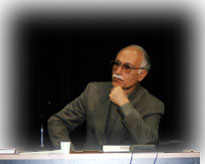|
The Two Sides of the Same Coin
Fanaticism and savagery
in an advanced and a primitive society
A thrill-seeking leader of an extremist cult in Gainesville,
Florida performs a ceremonial burning of the Moslemsí holy book in front of his
twenty odd congregation of mainly his family. In reaction to this idiotic act,
some Moslems in Afghanistan embark on a blind massacre of U.N. workers as a
bitter retaliation to his offensive act. It is said that a fool throws a rock in
the well and a hundred wise men will wonder how they can get it out. There is
also this Persian idiom: A smithy commits a crime in Balkh, for which a
coppersmith is beheaded in Shushtar!
The Taliban Afghansí act of revenge, leaving scores dead and injured was so
heinous, disproportionate and unjust that it overshadowed Terry Jonesí antics.
But if we distinguish outcome from intentions and base our judgment according to
the upbringing and culture of both sides, Terry Jonesí behavior, particularly in
the light of the tolerant culture of America, his previous experience in this
matter and warnings of the official authorities concerning the possible outcome,
is equally criminal and should be considered as the other side of the coin of
barbaric fanaticism.
Unfortunately given the lack of accurate knowledge about Islam in the west, many
of these acts of tribal behavior are considered as part of the teachings of
Islam.
In primitive tribal culture, individual identity is dissolved in the tribal
identity, so that an act by a member of the tribe is considered as an act
committed by the whole tribe. This is not a part of Islam and in fact it is
condemned by it. The behavior of the followers of any sect or religious order at
any given time or place cannot necessarily be interpreted as the true teachings
of that faith. The deeds of the church in the Middle Ages fall far short of the
teachings of the loving and compassionate Jesus.
The Koran clearly condemns the heinous acts of both sides of the coin of
fanaticism. In the light of personal experience as a student and teacher of
Koran for half a century, and supported by the following verses of the Holy
Book, I submit categorically that not only the Koran does not support them, but
in fact using the criteria set by the Holy Book they are severely condemned.
1. Condemnation of offensive reaction to
othersí beliefs and dissenting views.
The Koran prohibits insulting even the atheists or idol
worshipers lest it incites a blasphemous reaction. It emphasizes that peoples'
behavior appears perfectly presentable to themselves (otherwise they would not
indulge in it). The book tells us to leave the final judgment to God.
(6:108) Do not insult the unbelievers or those who appeal
to others instead of God, lest they insult God as an enemy without even
realizing it. Thus we have made alluring to each people its own doings.
Their return shall be to their Lord, and we shall then tell them the truth
of all that they did.
On this topic there are many historical precedents set by the
Moslem prophet and early leaders that can be presented in a different context.
2. Condemnation of inciting unrest in the
face of insults to oneís faith.
There is an explicit code of conduct for those Moslems who find
themselves in a situation or a gathering where Godís revelations are subjected
to ridicule and denial; they should temporarily leave the assembly until there
is a change in the topic of discussion.
This verse of Koran was not revealed during the earlier period when Moslems were
weak and outnumbered. It was revealed at the peak of Moslem power in Medinah.
It implies that even when the Words of God in the verses of the Koran are
ridiculed or declared false, Moslems have no other duties except to disengage
until the topic or the situation changes. Under no circumstances are they
justified to harass or attack the insulting parties or are they allowed to break
up their meetings.
(4:140) In the Book, He has revealed to you that whenever
you hear Godís words disbelieved in and ridiculed, you should not sit with
them until they change to some other topic.
In the Koran as in the Torah, The penal laws dictate that
wrongful deeds should either be pardoned or have a proportionate reaction.
Therefore under these rules, such reprehensible criminal acts can never be
justified as retaliation against a deviant thought.
In the Koran, Moslems have been warned that they will be subject to many hurtful
words and acts from the people of the Book (i.e. the Jews and the Christians)
and atheists. With forbearance and self- control they will show their
determination and strong will power.
(3:16) You shall certainly be tried and tested in your
possessions and in your personal selves; and you shall certainly hear much
that will grieve you from those who received the Book before you and from
those who worship many gods. But if you persevere patiently, and guard
against devil, then that will be a determining factor in all affairs.
The Koranís recommendation in facing and confronting these
violations and incursions into religious beliefs is to face the opponents by
reason and good example. To engage them in civil and attractive debates, all the
time remembering that God in His divine wisdom knows best who is right and who
has gone astray (We should not sit in judgment in His place).
|
![]()


